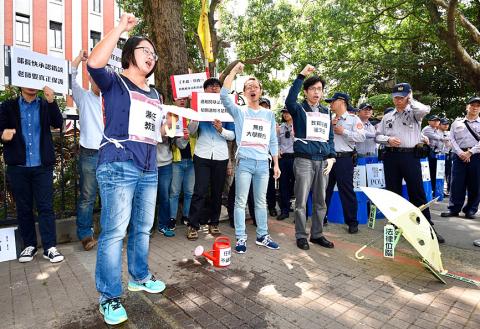A Ministry of Education draft bill for transitioning and closing private universities lacks safeguards for disposing of school property, the Taiwan Higher Education Union said yesterday, calling for the assets of dissolved schools to be placed in a public higher-education trust.
Numerous private universities are expected to merge or fold in the near future due to declining student numbers, potentially paving the way for massive layoffs of university instructors.
“The ministry is basically giving schools a blank check on how they want to transition,” union chairwoman Liu Mei-chun (劉梅君) said, blasting a ministry proposal to set aside NT$5 billion (US$165 million) in special subsidies for “transitioning” schools, while failing to earmark funds for severance pay.

Photo: Peter Lo, Taipei Times
“After the money is given to schools, it will just disappear, and teachers will only be able to get a hold of their share after long and arduous lawsuits,” she said.
“The Ministry of Education is not willing to shoulder its responsibility to take over the management of struggling schools,” said Su Tzu-hsuan (蘇子軒), the union’s student action committee convener, questioning a ministry proposal to provide “guidance” to schools that fall behind in paying salaries, rather than filing court motions to replace their boards and take direct control.
“The ‘professional guidance’ proposal is a feint because only schools’ founding capital and physical property would be put in trust during the guidance period,” he said, citing bank accounts, special funds and investments of subsidiary organizations as examples of resources over which struggling school boards would retain direct control.
Rights campaigners have expressed concern that school boards might choose to divert school resources rather than pay teachers’ benefits, with Alliance Against the Commercialization of Education member Hsieh Yi-hung (謝毅弘) saying that a survey by his group had found that the nation’s 107 private universities have NT$14.5 billion in bank funds alone.
Su also criticized the ministry’s removal of requirements that school closures be passed by an internal school advisory committee or a consensus after talks with teacher and student representatives.
While there are provisions requiring severance payments for laid-off teachers, there are no rules on how these should be paid out, effectively allowing schools to set the terms, he said.
Union executive secretary Chen Chiung-ting (陳炯廷) called for the property and capital of closed schools to be placed in a public fund, which can be used for improving student-teacher ratios, lowering tuition in the remaining schools and other objectives.

An essay competition jointly organized by a local writing society and a publisher affiliated with the Chinese Communist Party (CCP) might have contravened the Act Governing Relations Between the People of the Taiwan Area and the Mainland Area (臺灣地區與大陸地區人民關係條例), the Mainland Affairs Council (MAC) said on Thursday. “In this case, the partner organization is clearly an agency under the CCP’s Fujian Provincial Committee,” MAC Deputy Minister and spokesperson Liang Wen-chieh (梁文傑) said at a news briefing in Taipei. “It also involves bringing Taiwanese students to China with all-expenses-paid arrangements to attend award ceremonies and camps,” Liang said. Those two “characteristics” are typically sufficient

A magnitude 5.9 earthquake that struck about 33km off the coast of Hualien City was the "main shock" in a series of quakes in the area, with aftershocks expected over the next three days, the Central Weather Administration (CWA) said yesterday. Prior to the magnitude 5.9 quake shaking most of Taiwan at 6:53pm yesterday, six other earthquakes stronger than a magnitude of 4, starting with a magnitude 5.5 quake at 6:09pm, occurred in the area. CWA Seismological Center Director Wu Chien-fu (吳健富) confirmed that the quakes were all part of the same series and that the magnitude 5.5 temblor was

The brilliant blue waters, thick foliage and bucolic atmosphere on this seemingly idyllic archipelago deep in the Pacific Ocean belie the key role it now plays in a titanic geopolitical struggle. Palau is again on the front line as China, and the US and its allies prepare their forces in an intensifying contest for control over the Asia-Pacific region. The democratic nation of just 17,000 people hosts US-controlled airstrips and soon-to-be-completed radar installations that the US military describes as “critical” to monitoring vast swathes of water and airspace. It is also a key piece of the second island chain, a string of

The Central Weather Administration has issued a heat alert for southeastern Taiwan, warning of temperatures as high as 36°C today, while alerting some coastal areas of strong winds later in the day. Kaohsiung’s Neimen District (內門) and Pingtung County’s Neipu Township (內埔) are under an orange heat alert, which warns of temperatures as high as 36°C for three consecutive days, the CWA said, citing southwest winds. The heat would also extend to Tainan’s Nansi (楠西) and Yujing (玉井) districts, as well as Pingtung’s Gaoshu (高樹), Yanpu (鹽埔) and Majia (瑪家) townships, it said, forecasting highs of up to 36°C in those areas